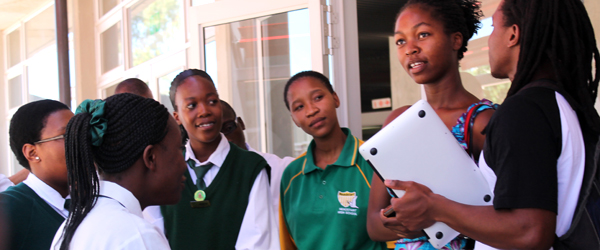Kovsie Debate team compete against high school learners in debate on volunteerism
 |
Learners from Headstart High School with Kovsie students.
Photo: Linda Fekisi |
Grade 12 learners from Headstart High School took on a team from the university in a debate on the Bloemfontein Campus. The school, in partnership with the University through the Schools Partnership Programme, will be visiting various divisions within the institution in the next four years.
The topic of the debate, Volunteerism and Social Citizenship, was brought forward by the Volunteers Office which is part of Kovsie student life. “The aim was to share our knowledge on volunteerism with the learners and at the same time encourage them to do their own research on the topic. We are making use of experimental learning to make them used to the whole notion of volunteerism”, said the Assistant Dean for Student Affairs, Pura Mgolombane.
The learners, who receive English lessons by Prof Jonathan Jansen, Vice-Chancellor and Rector, engaged in the conversation with ease as they expressed their own views on the subject matter. Their debate was moderated by the Chairperson of the Debate Society, Zola Valashiya.